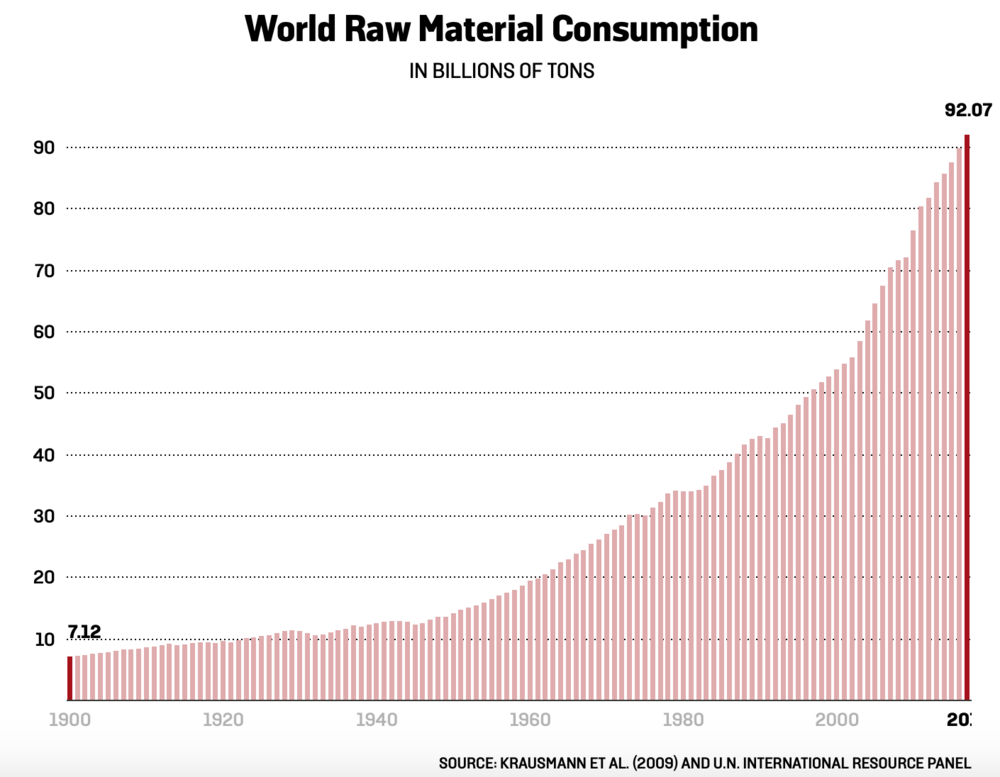Can we “green growth” our way out of the coming slump?
Posted on 22 Jul 2020 Categories: Blog, Climate crisis, Cross-posts
by The Alternative UK
It doesn’t exist, says Jason Hickel. And more from the “de-growth” discourse.

Here, we turn to economist and anthropologist Jason Hickel a lot when we want to hear a lucid and well-researched voice arguing the case against the growth economy.
This piece for Foreign Policy takes on directly the idea that there might be a painless road to addressing our over-consumption of the planet’s resources. Can we make the savings through the sheer, brilliant and increasing efficiency of our technologies and methods? Can we “decouple” the growth in our economies from the growth of our resource use?
Hickel goes to town on a recent book by the MIT economist Andrew MacAfee, More From Less, which purports to show that major economies, like the US, are “dematerializing” themselves, by means of smart tech and the shift to services – resource use has been declining over all since the 1980s. Good news! No change in behaviour needed!
The problem is, says Hickel, is that it’s based on an “accounting error”:
McAfee uses data on domestic material consumption, which tallies up the resources that a nation extracts and consumes each year. But this metric ignores a crucial piece of the puzzle.
While it includes the imported goods a country consumes, it does not include the resources involved in extracting, producing, and transporting those goods.
Because the United States and other rich countries have offshored so much of their production to poorer countries over the past 40 years, that side of resource use has been conveniently shifted off their books.
In other words, what looks like “green growth” is really just an artifact of globalization. Given how much the U.S. economy relies on offshored production, McAfee’s data cannot be legitimately compared to U.S. GDP, and cannot be used to make claims about dematerialization.
Ecological economists have been aware of this problem for a long time. To correct for it, they use a more holistic metric called “raw material consumption,” which fully accounts for trade.
When we look at this data, which is readily available from the United Nations, the story changes completely. We see that total resource use in the United States hasn’t been falling at all; in fact, it has been rising more or less exactly in line with GDP.
The same is true of all other major industrial economies, including the European Union, and the OECD as a group. There has been zero dematerialization. No green growth. It was all an illusion of accounting.
This is a problem, because McAfee holds rich nations up as an example for the rest of the world to follow; but if rich nations are achieving “green growth” by offshoring, then this approach by definition cannot be universalized. Where will the rest of the world offshore to?
This is why, when we zoom out and look at the world economy as a whole, where trade no longer makes a difference, we see that global resource use hasn’t been slowing down at all, no matter what metric you use.
In fact, it has been accelerating since 2000, rising at a historically unprecedented rate, even to the point of outstripping GDP. In other words, the world economy has been rematerializing. It’s the exact opposite of green growth.
More here. Quite a take-down, if so.
Further on in the piece, Jason refreshed the familiar arguments that more conventional, toxic GDP growth does not equal more wellbeing: “Take life expectancy, for example. Japan beats the United States in life expectancy by more than five years, with 35 percent less GDP per capita. South Korea also beats the United States with 50 percent less GDP per capita. Portugal, too, with 65 percent less GDP per capita. Costa Ricans live longer, healthier lives than Americans, with 80 percent less GDP per capita”.
Jason’s inescapable conclusion is this:
What are our options? If we want to reduce resource use—which we must do if we are to avert ecological collapse—then we cannot wait around for dematerialization to somehow miraculously occur, when all the evidence suggests it’s not going to happen. We need to be smarter than that.
The only fail-safe strategy is to impose legally binding caps on resource use and gradually ratchet it back down to safe levels. Ecological economists have been calling for this for decades.
In a way, this is an elegant solution to the long-standing debate about green growth. If McAfee and others really believe that GDP will keep growing despite active reductions in material use, then this shouldn’t worry them one bit. In fact, they should welcome such a move—it will give them a chance to prove once and for all that they are right.
But, to my knowledge, not a single proponent of green growth has ever agreed to this proposal. Perhaps on some deep level, despite the rosy rhetoric, they realize that this isn’t how capitalism actually works.
For 200 years, capitalism has depended on extraction from nature. It has always needed an “outside,” external to itself, from which it can plunder surplus value, for free—or as close to free as possible. To put a limit on material extraction is to kill the goose that lays the golden eggs.
More here. Yet A/UK was involved in an interesting discussion the other week, which asked whether the regulatory, directive state was the only real route to the kind of deep, behavioural and structural changes that Hickel seeks.
What forms of power would an anarchist, a cosmolcalist, and a de-growth expert think were just as effective as a state (for which we might be waiting a long while to be recaptured for planet-friendly forces).
This was the topic of an episode in Katja Pellin’s De-Growth Talks on YouTube: “will the transformation towards a more sustainable and equitable socioeconomic system require going with, without or against the state?” Katja is steadly building up a powerful archive of discussions on the degrowth topic. Pat Kane, co-initiator of the Alternative UK, was joined by two other guests, details below:
Ekaterina Chertkovskaya is a researcher based at Lund University, working on degrowth and critical organisation studies, with particular interests in alternative organising, plastics and work. She co-edited Towards a political economy of degrowth (2019), co-organised the 6th International Degrowth Conference in Malmö and is part of the editorial collective of ephemera journal.
Ruth Kinna is a political theorist and historian of ideas at Loughborough University and a member of the Anarchism Research Group. She has recently been working on a project to constitutionalise anarchy. Although much of her work is historical, she is interested in applications of anarchist ideas, particularly mutual aid.
There’s an excellent archive of links to the works of the speakers and other resources below the YouTube video.
This was originally posted on the Alternative UK blog on 18th June 2020.
Posted on 22 Jul 2020 Categories: Blog, Climate crisis, Cross-posts


